
Browse an alphabetical list of photographs. These historical images portray people, places, and events before, during, and after World War II and the Holocaust.
<< Previous | Displaying results 51-60 of 2641 for "Photo" | Next >>
A Czech woman who witnessed the Nazi massacre of the male inhabitants of Lidice is sworn in at the RuSHA trial in Nuremberg, case #8 of the Subsequent Nuremberg Proceedings. Germany, October 30, 1947.
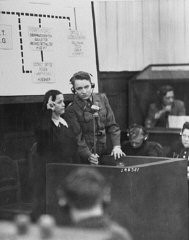
Panel from the exhibition A Dangerous Lie: The Protocols of the Elders of Zion which was on display at the United States Holocaust Memorial Museum from 2006–18. The exhibition explored the continuing impact of the most widely distributed antisemitic publication of modern times.
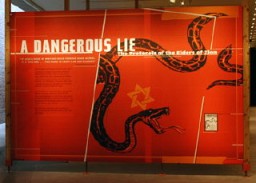
An emaciated child eats in the streets of the Warsaw ghetto. Warsaw, Poland, between 1940 and 1943.
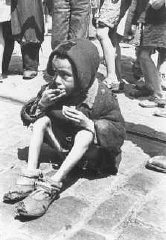
A display advertising the 11th Summer Olympic Games which were held in Berlin, Germany, 1936.
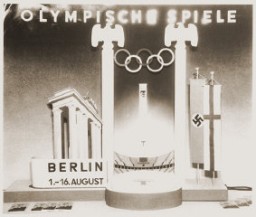
A Dutch survivor of the Ohrdruf camp shows the camp's gallows, which the Germans used to execute prisoners, to US forces (including Generals Eisenhower, Bradley, and Patton). Germany, April 12, 1945.
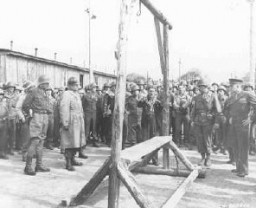
A family stands outside of their wagon while interned in a Zigeunerlager ("Gypsy camp"). In the background, children are crowded around Eva Justin. Justin worked for the Center for Research on Racial Hygiene and Demographic Biology. Schleswig-Holstein, Germany, 1938. During the Nazi era, Dr. Robert Ritter was a leading authority on the racial classification of people pejoratively labeled “Zigeuner” (“Gypsies”). Ritter’s research was in a field called eugenics, or what the Nazis called…
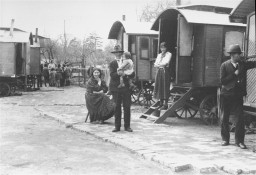
A family of Macedonian Jews in the Tobacco Monopoly transit camp in Skopje before deportation. Skopje, Yugoslavia, March 1943. The Jews of Bulgarian-occupied Thrace and Macedonia were deported in March 1943. On March 11, 1943, over 7,000 Macedonian Jews from Skopje, Bitola, and Stip were rounded up and assembled at the Tobacco Monopoly in Skopje, whose several buildings had been hastily converted into a transit camp. The Macedonian Jews were kept there between eleven and eighteen days,…
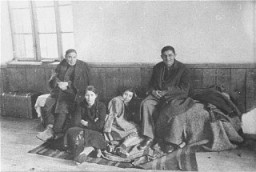
Frieda Greinegger during a family outing to a park in the mid-1930s. Frieda would later spend almost two years in the Ravensbrück concentration camp as punishment for consorting with a Polish forced laborer, Julian Noga. Austria, ca. 1935.
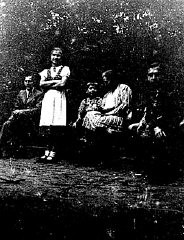
Portrait of a gay couple. Berlin, Germany, ca. 1930. Nazi ideology identified a multitude of enemies and led to the systematic persecution and murder of many millions of people, both Jews and non-Jews. The Nazis posed as moral crusaders who wanted to stamp out the "vice" of homosexuality from Germany in order to help win the racial struggle. Once they took power in 1933, the Nazis intensified persecution of German male homosexuals.
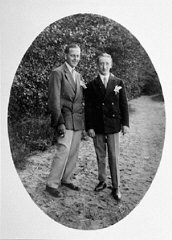
A German Jewish prisoner named Rosenthal pushes a cart in the stone quarry of the Im Fout labor camp in Morocco. The camp housed a group of foreign workers, many of whom fell ill because of poor living conditions. Im Fout, Morocco, 1941-42.
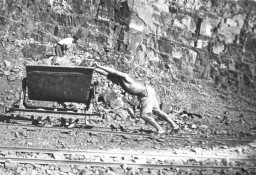
We would like to thank Crown Family Philanthropies, Abe and Ida Cooper Foundation, the Claims Conference, EVZ, and BMF for supporting the ongoing work to create content and resources for the Holocaust Encyclopedia. View the list of donor acknowledgement.